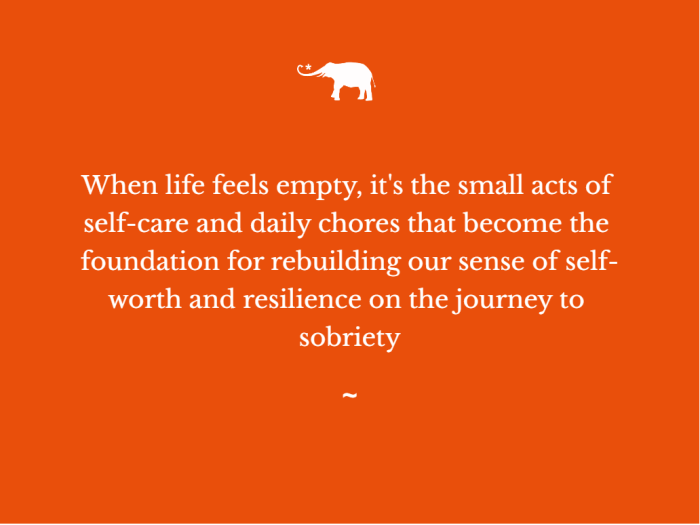As I navigate this journey of sobriety, the first unmistakable sign that it’s the right path is the profound improvement I feel in myself. Even though there are moments when life seems empty, mundane, and lacking the usual fun, I’m acutely aware of the positive transformation within me. As a homemaker, I’ve witnessed a remarkable change in my daily routine. While I may not have embarked on deep cleaning missions just yet, I’ve reclaimed control over the basics—washing the dinner dishes, making the bed, tidying up the bathroom, and managing laundry. In contrast, the days when I’m ensnared by the aftermath of hangovers are marked by chaos and neglect. The mounting tasks and overwhelming clutter serve as a breeding ground for the craving to escape through a drink, and the saying ‘a tidy home, a tidy mind’ takes on a poignant meaning. When I’m in the grip of alcohol’s aftermath, unfinished chores become a source of self-perceived failure and trigger the urge to drink. In sobriety, these chores flow effortlessly, devoid of stress or anxiety. They’ve become part of my daily rhythm, a reflection of the positive metamorphosis occurring within me.
I’ve noticed something interesting about some of my close aunties—they tend to channel their drinking energy into cleaning. It’s a bit perplexing, but I guess it might be a way to avoid feeling like a failure and maybe even justify having a drink afterward? Oddly enough, it’s almost reassuring that I don’t become super productive with a hangover because that could lure me back to the bottle.
Those with keen eyes, like my husband, kids, and my mother, who visits often, should be able to tell whether I’ve been drinking or not based on the state of the home. If the dishes are piled up, the bed remains unmade, and the bathroom is a mess, it’s a clear sign that I may have slipped. It’s like having an unsung accountability system at home, a silent reminder of the path I’ve chosen to walk in sobriety.
This brings me to the importance of these basic chores and self-care, especially when dealing with the mental health issues that often accompany alcohol abuse. Alcohol can be a deceptive escape—it offers a fleeting respite from our troubles, but it doesn’t address the underlying issues. Neglecting the simple tasks of daily life during these times can exacerbate feelings of worthlessness and despair. However, as I’ve embarked on this journey toward sobriety, I’ve come to understand that taking care of the basics, like a clean living space and personal hygiene, plays a vital role in maintaining mental well-being. These seemingly small acts of self-care aren’t just about keeping up appearances; they serve as a foundation for rebuilding one’s sense of self-worth and resilience. They are the building blocks of a healthier, more stable mindset, which is crucial in facing and overcoming the challenges brought on by alcohol abuse.


 Share on bsky
Share on bsky




Read 0 comments and reply